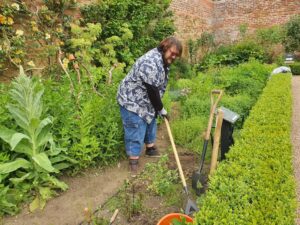The THRIVE Project: Supporting Wellbeing Through Heritage Volunteering
Through a blend of volunteering, employability, and creative activities, the THRIVE project delivers valuable wellbeing support to people living with mental health challenges. Dr Sandra Mackenzie, Heritage Engagement Manager for the Abbotsford Trust, highlights how project participants, volunteers, and staff have all benefitted from the outcomes of THRIVE.

The project
The THRIVE project is the result of a partnership between the Abbotsford Trust and Scottish Borders Council’s Local Area Co-ordination – Mental Health (LAC) service. The Local Area Co-ordination service supports adults (18+) who have acknowledged mental health difficulties that are affecting their quality of life.
The project was aimed at adults who have engaged with the LAC service and offered seven-week blocks of on-site group activities which focused on wellbeing, employability, and improved mental health. A small number of places were available per block (three initially, rising to four in 2023).
Each week focused on a different work area and gave participants hands-on experience through a range of taster activities such as gardening, customer service, ‘behind the scenes’ activities such as digital marketing, visitor interpretation, and creative activities.
The project aimed to give each participant an opportunity to:
- improve their physical and mental health
- become a more active member of their local community
- build structure and focus into their week
- re-build confidence and self-esteem
- further develop life skills such as timekeeping, communication skills, and resilience
- gain an insight into their own local heritage and make a valuable contribution to an internationally significant heritage site
- become familiar with our facilities (e.g. the estate path network) and build the confidence to access these independently to support wellbeing
- gain experience of volunteering in preparation for a more committed opportunity at Abbotsford or elsewhere
- gain an insight into careers within the tourism sector
To date, we have completed a pilot (November 2021 – July 2022) and a second stage of the project (January – July 2023). The pilot was kindly funded by Scottish Borders Council’s Build Back a Better Borders Recovery Fund and the Clark Woodlands Trust. The second stage was funded by Scottish Borders Council’s Eildon Neighbourhood Support Fund.
“As a person with lived mental health experience, I never felt judged and felt supported throughout the course.”
THRIVE participant
Successes
- Over the last two years, we have supported 21 local people to participate in the project – the majority of whom completed all of the sessions in their seven-week block. This is a marker of success as we know that anxiety, depression, and the knock-on effects of medication can make everyday life a challenge for many of our participants. Mixing with others can also be source of anxiety for some, so we are delighted that the small group format and staff support provided have been so well received.
- All of the participants who gave feedback have been positive about the contribution the project has made to their overall mental health. The majority of our respondents to our final questionnaire indicated a positive impact on their self-esteem, confidence, and wellbeing, and everyone rated their overall experience as either ‘excellent’ or ‘very good’. The project has provided a safe and secure environment and a programme of activity that has allowed our participants to genuinely consider how to make changes in their own lives for the better, including the possibility of volunteering within heritage for the first time.
Challenges
- Whilst our staff felt confident, we were conscious that we are not mental health professionals and had had no prior training in this area. Staff undertook a free Improving Mental Health and Preventing Suicide course and Scotland’s Mental Health First Aid training. This has been an important step forward in our confidence and preparation for work with this audience and we have used this as an opportunity to open up conversations around mental health and wellbeing within our organisation to break down stigma.
- As the project requires referral through a third-party partner organisation, we were reliant on our colleagues in the LAC service to manage the recruitment of participants. As this project is a stepping-stone in a long-term recovery journey for every person who takes part, we rely upon the professional judgement and support of the LAC team to fill the available places and identify clients for subsequent blocks. Due to funding timescales, the LAC team sometimes had to do this with a short lead-in time and it was difficult to fill places if anyone dropped out at short notice as other clients may not be ready or have other commitments. If future funding can be secured, we aim to offer THRIVE as a rolling programme with set annual dates which would alleviate the ‘stop-start’ nature of this problem.

Impact
- We are delighted that the project has encouraged participants to consider volunteering as a positive option. As a result of the pilot project, two participants started to volunteer within their communities and five were actively considering volunteering in the future. In 2023 two participants joined the Abbotsford volunteer team, and one is due to start in 2024. This not only supports personal development and routes into employment, but also bolsters the resilience of the heritage sector as working age adults engage with volunteering .
- The project has also demonstrated the potential of our existing volunteer team as mentors or ‘buddies’. We are keen to explore this source of peer support going forward.
- Through participants’ feedback we know that several people had never had the opportunity to visit Abbotsford and discover the significance of the heritage on their doorstep. This project has literally opened the doors for more local residents, provided a secure and inclusive space for them, and encouraged them to further access heritage independently.
Guidance
- At the suggestion of the LAC, we built in a familiarisation week before each block began. This was a crucial exercise for building participant confidence and addressing any fears or concerns.
- With the relaxation of COVID-19 restrictions, we were able to slightly increase the number of places for the second stage of the project. We feel that four is the optimum group size.
- We responded to feedback from the LAC service on the timings of the project to make it more inclusive, shifting the start time back to mid-morning and ending in the afternoon before school pick-up time.
- We spent a significant amount of time developing an evaluation method which works well for all parties involved, and aligned our work with the Six Ways to be Well in the Scottish Borders framework developed by the Scottish Borders Community Planning Partnership Joint Health Improvement Team.
- The organisational partnership we have developed with the LAC service has been key to the success of this project and we could not have imagined our small heritage charity being able to facilitate such an innovative project without this crucial support. The LAC service gave us invaluable advice and guidance in the design and focus of the project and facilitated client recruitment. They also empowered and reassured everyone involved by providing in-person and telephone support for clients and Abbotsford staff while activities were running on site.
Additional information
Email: the Abbotsford Heritage Engagement team
Visit: The THRIVE project page on the Abbotsford website
Visit: Borders Care Voice – Improving Mental Health and Preventing Suicide in the Scottish Borders
Visit: The Scottish Mental Health First Aid website
Download: NHS Borders – Six Ways to Be Well guidance